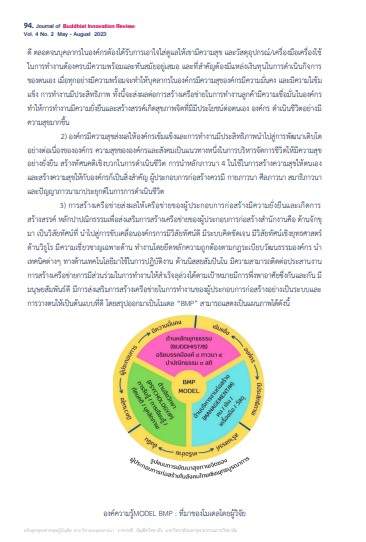A Buddhist Intergrated mental health Development fo Construction entreprenurs in Thai society.
Main Article Content
Abstract
This research has three objectives: 1) To study the mental health state of the construction entrepreneurs in current Thai society, 2) To study Buddhadhamma, the Buddhist principles for improving mental health of the construction entrepreneurs in Thai society, 3) To present the Buddhist integrated approach model for improving mental health of the construction entrepreneurs in Thai society. This research is qualitative research. The methods include in-depth interviews from twenty interviewees, and documentary research for suitable Buddhadhamma for improving mental health of the construction entrepreneurs through Buddhist integrated approach. From data analysis, the research found that the current mental health of the construction entrepreneurs can be summarized as follows: 1) Mental health during normal mental state. A mentally healthy person must be happy and is able to do things according to one’s physical, intellectual, and mental capability. He can be aware of trouble that will affect his own mind. 2) Mental health during construction crisis. It is the state that will affect mental health, cause stress, anxiety, discouragement, lack of work motivation and depression. 3) Behavior and effect from mental health will cause stress, worry, anxiety, depression, impaired work function, aggression, despair, discouragement, and risk for suicide. The behavior and the effect from mental health will lead to accumulated stress and make life under stress and pressure. Buddhadhamma for improving mental health of the construction entrepreneurs are four mental developments (bhāvanā), The qualities of a successful businessperson (pāpaṇika dhamma), The noble eightfold path, and mindfulness (sati). The Buddhist integrated approach model for improving the mental health of the construction entrepreneurs is “BMP” model. This model can be applied for stability and sustainability improvement of the construction entrepreneurs’ mental health.
Article Details

This work is licensed under a Creative Commons Attribution-NonCommercial-NoDerivatives 4.0 International License.
เรื่องลิขสิทธิ์/เป็นความคิดเห็นของผู้เขียน
References
เอกสารอ้างอิง :
หนังสือ :
สมเด็จพระญาณสังวร (สุวฑฺฒโน). (2549). การบริหารจิตสำหรับผู้ใหญ่. กรุงเทพมหานคร: โรงพิมพ์มหามกุฏราชวิทยาลัย.
Pilcher Roy. (1976). Principles of Construction Management. London : Mcgraw–Hill Book.
มหาวิทยาลัยมหาจุฬาลงกรณราชวิทยาลัย. (2539). พระไตรปิฎก ภาษาไทยฉบับมหาจุฬาลงกรณราชวิทยาลัย. กรุงเทพมหานคร: โรงพิมพ์มหาจุฬาลงกรณราชวิทยาลัย.
วารสาร :
อัฐฉญา แพทย์ศาสตร์. (2562). แนวทางการสร้างเสริมคุณภาพชีวิตด้านจิตใจและด้านความสัมพันธ์ทางสังคมของผู้สูงอายุในตำบลห้วงน้ำขาว จังหวัดตราด. วารสารวิจัยรำไพพรรณี.13 (1);119.
สื่ออิเล็กทรอนิกส์ :
กรมสภาพจิตร่วมกับ สปสช. ปัญหาสุขภาพจิตมีแนวโน้มสูงขึ้นทั่วโลก เร่งขยายสิทธิประโยชน์ด้านการรักษา. (ออนไลน์). แหล่งที่มา: www.hfocus.org/content. (วันที่สืบค้น 7 เมษายน 2566).
ศูนย์สุขภาพใจ. ปัญหาสุขภาพจิตคุกคามชีวิตวัยทำงาน.(ออนไลน์). แหล่งที่มา: www.vimut.com/ article. (วันที่สืบค้น 7 เมษายน 2566)
Reference :
Books :
Somdej Phra Yan Sangworn (Suwatthano). (2006). Mind Management for Adults. Bangkok: Mahamakut Rajawittayalai Printing House.
Pilcher Roy. (1976). Principles of Construction Management. London : Mcgraw–Hill Book.
Mahachulalongkornrajavidyalaya University. (1996). Thai Tripitaka Mahachulalongkornrajavidyalaya Edition. Bangkok: Mahachulalongkornrajavidyalaya University Printing House.
Journal :
Atcharya Paetsaat. (2019). Guidelines for enhancing the quality of life in terms of mental and social relationships of the elderly in Huai Nam Khao Subdistrict, Trat Province. Ramphaiphannee Research Journal. 13 (1); 119.
Electronic media:
The Department of Mental Health, in collaboration with the National Health Security Office (NHSO), is addressing the increasing trend of mental health problems worldwide and is accelerating the expansion of healthcare benefits. (Online). Source: www. hfocus.org/content. (Accessed April 7, 2023)
Mental Health Center. Mental health problems threaten working-age lives. (Online). Source: www. vimut.com/article. (Accessed April 7, 2023)


